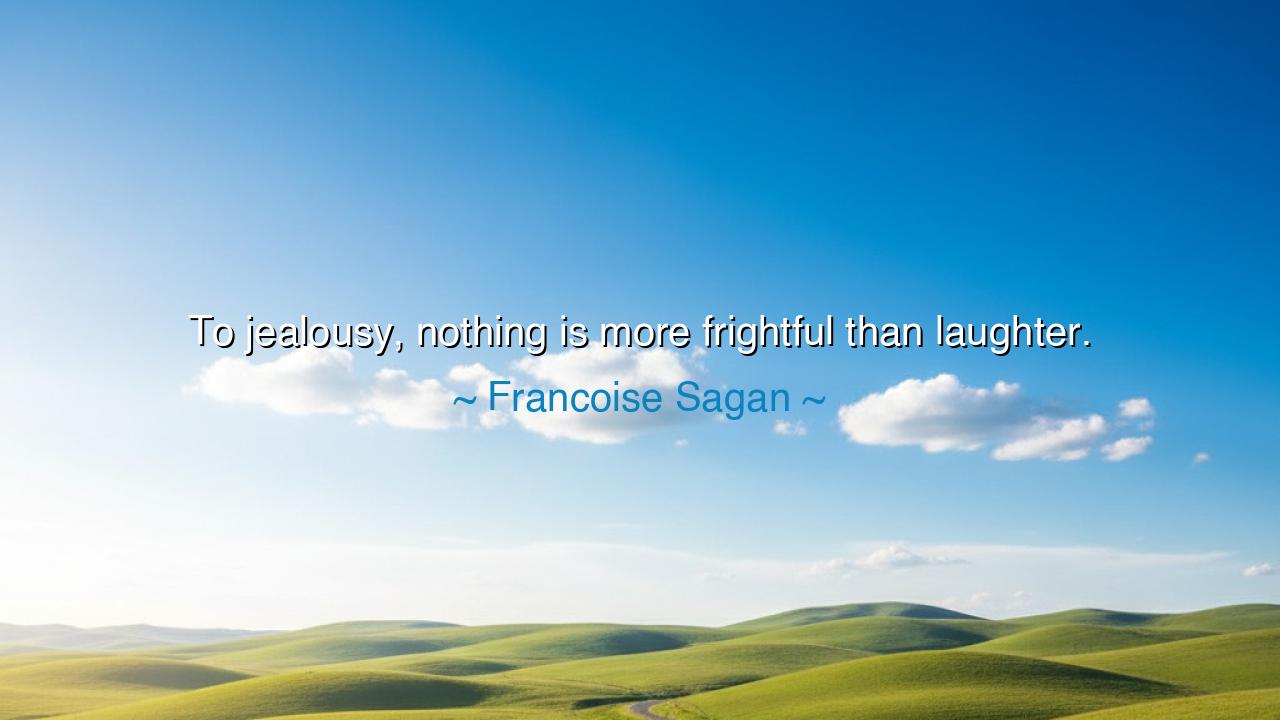
To jealousy, nothing is more frightful than laughter.






Hearken, children of wisdom, and heed the words of Francoise Sagan, whose insight penetrates the hidden recesses of the human heart: “To jealousy, nothing is more frightful than laughter.” Pause upon these words, for they reveal a profound and subtle truth: the power of laughter is not merely in its joy, but in its ability to illuminate freedom, resilience, and grace—the very things that envy and jealousy cannot abide. When one is consumed by envy, the sound of untroubled mirth becomes a mirror of what they lack and a reminder of the inner peace they have forsaken.
Jealousy thrives on comparison, on the obsession with what another possesses or achieves. It distorts the mind and constricts the soul, rendering it blind to beauty, warmth, and the small blessings of life. Yet laughter, spontaneous and unrestrained, pierces through the darkness. It mocks the chains of envy, revealing that the jealous heart is shackled while the joyful heart is free. In this, Sagan teaches that the vitality of spirit and the lightness of heart are the greatest foes of envy.
History and legend offer vivid testimony to this truth. Consider the court of Louis XIV, where intrigue and envy festered among courtiers who coveted the king’s favor. Those who could maintain a sense of levity, who could laugh and celebrate life despite the undercurrents of rivalry, often remained unscathed by the corrosive whispers of jealousy. Their laughter became armor, a shield against the petty malice that sought to dim the brilliance of others. In the presence of mirth, envy recoils, powerless against the strength of joy.
Even in the realm of personal relationships, the lesson holds. Recall the story of the great playwright Molière, whose comedies delighted kings and commoners alike. Many envied his success, his wit, and his unflinching brilliance. Yet Molière’s laughter—both in his writing and his performance—was invulnerable to envy. It revealed that creativity and joy, when expressed openly, cannot be diminished by jealousy. The jealous may gnash teeth and whisper behind closed doors, but they cannot extinguish the vitality that springs from genuine laughter.
The danger of jealousy lies in its blindness. It sees only what it covets, and in doing so, it becomes fearful of what it cannot control, including happiness, beauty, and humor. Laughter is frightening to envy because it is unbound, irrepressible, and deeply human. It cannot be bought, coerced, or stolen. When the heart laughs freely, it asserts its freedom, mocks obsession, and reminds the envious of their own inner prison. This is the power that Sagan illuminates: laughter is not mere sound, but a force that exposes and undermines jealousy.
Practical wisdom emerges from this reflection. When encountering envy—whether in oneself or others—cultivate joy, resilience, and the ability to laugh in the face of adversity. Celebrate successes, delight in small pleasures, and engage in acts that cultivate humor and lightness of spirit. By embracing laughter, one not only preserves one’s own freedom but diminishes the power of envy over oneself and over others. The jealous heart is terrified by what it cannot corrupt, and laughter is the purest demonstration of that incorruptibility.
Moreover, laughter connects us to one another, creating bonds that envy cannot sever. Communities, families, and friendships thrive not on comparison but on shared joy and mirth. By cultivating a spirit of humor and celebration, one strengthens ties, builds resilience, and creates a space in which jealousy loses its dominion. The ancient sages understood this: joy, especially expressed openly, is both a remedy and a shield.
Therefore, generations to come, remember Sagan’s wisdom: to jealousy, nothing is more frightful than laughter. Guard the lightness of your spirit, embrace joy freely, and let mirth flow as a river that no envy can dam. In doing so, you preserve freedom of heart, cultivate resilience, and illuminate the world around you. Let laughter ring out, unrestrained and sacred, for it is both a triumph over envy and a celebration of life itself.
If you wish, I can also craft a more poetic and allegorical version, depicting jealousy as a shadow recoiling from the radiant light of laughter, suitable for dramatic narration or meditation. Do you want me to do that?






AAdministratorAdministrator
Welcome, honored guests. Please leave a comment, we will respond soon